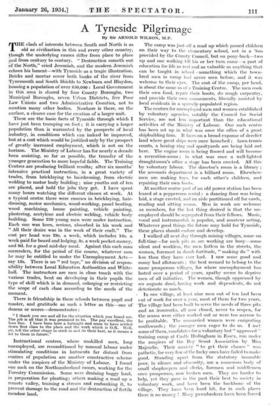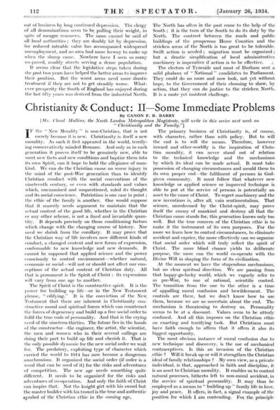A Tyneside Pilgrimage
By Sir ARNOLD WILSON, M.P.
TIIE clash of interests between South and North is as old as civilization in this and every other country, though the underlying causes differ from place to place and from century to century. " Destruction cometh out ft. of the North," cried Jeremiah, and the modem Jeremiah echoes his lament—with Tyneside as a tragic illustration. Bricks and mortar cover both banks of the river from Tynemouth and South Shields to Newburn and Blaydon, housing a population of over 850,000: Local Government in this area is shared by four County Boroughs, two Municipal Boroughs, seven Urban Districts, five Poor Law Unions and two Administrative Counties, not to mention many other bodies. Nowhere is there, on the surface, a clearer case for the creation of a larger unit.
These are the basic facts of Tyneside through which I have just been tramping on foot ; it is carrying a larger population than is warranted by the prospects of local industry, in conditions which can indeed be improved, but at a cost which would be justified only by the prospect of greatly increased employment, which is not on the horizon. The Ministry of Labour has for nearly a decade been assisting, so far as possible, the .transfer of the younger generation to more hopeful fields. The Training Centres are producing brilliant results; after six months' intensive practical instruction, in a great variety of trades, from bricklaying to hairdressing, from electric -welding to motor body building ; nine youths out of ten are placed, and hold the jobs they get. I have spent many hours watching the different 'classes at work. At a typical centre there were courses in bricklaying, hair- dressing, motor mechanics, wood-working, panel beating, wood machining, house painting, vehicle painting, plastering, acetylene and electric welding, vehicle body building. Some 220 young men were under instruction. Each one was keen, serious, absorbed in his work and " All their desire was in the work of their craft." The cost per head was 28s. a week, which includes 16s. a week paid for board and lodging, 3s. a week pocket-money, and 9d. for a good mid-day meal. Against this each man surrenders, for the period of the course, whatever sum he may be entitled to under the Unemployment Acts— say 13s. There is no " red tape," no division of respon- sibility between Local Education Authorities and White- hall. The instructors are men in close touch with the various trades, bent on developing in their pupils the type of skill which is in demand, enlarging or restricting the scope of each class according to the needs of the moment.
There it friendship in these schools between pupil and master, and gratitude as such a letter as this—one of dozens or scores—demonstrates : " I thank you one and all for the situation which you found me. The job is all that it was promised to be. The pay excellent, the boss fine. I have been here a fortnight and seem to have settled down first class to the place and the work which is O.K. Well, sir, tell the other chaps to stick in and do their best, as it means a lot to them in future."
Instructional centres, where unskilled men, long unemployed, are reconditioned by manual labour under stimulating conditions in hutments far distant from centres of population are another constructive scheme under the auspices of the Ministry of Labour. I found one such on the Northumberland *moors, working for the Forestry Commission. Some were draining boggy land, in preparation for planting; others making a road up a remote valley, training a stream and embanking it, to prevent damage to the road and the destruction of fertile meadow land, The camp was just off a road up which passed children on their way to the elementary school, not in a 'bus provided by the County Council, but on pony-back—two up and one walking till his or her turn came—a part of education for life as real and as valuable as anything that can be taught in school—something which the town- bred men in camp had never seen before, and it was welcome to their eyes. The cost of the camp, per head, is about the same as of a Training Centre. The men cook their own food, repair their boots, do rough carpentry, and provide their own amusements, liberally assisted by local residents in a sparsely-populated region.
The centres for unemployed men and women established by voluntary agencies, notably the Council for Social Service, are not less important than the educational activities of the Ministry of Labour. One such centre has been set up in what was once the office of a great shipbuilding firm. It faces on a broad expanse of derelict land where great ships were once launched ; lawn-tennis courts, a boxing ring and quoityards are being laid out here. The engine room is being floored and will become a recreation-room ; in what was once a well-lighted -draughtsman's office a stage has been erected. All this by voluntary labour. The director's room is a library ; the accounts department is a billiard room. Elsewhere men are making toys, for each other's children, and repairing their own boots.
At another centre part of an old power station has been leased at a peppercorn rental ; a dancing floor was being laid, a stage erected, and an aisle partitioned off for cards, reading and sitting rooms. Men in work arc welcome as members, for the last thing desired is that the un- employed should be segregated from their fellows. Music, vocal and instrumental, is popular, and amateur acting. Whatever good things the future may hold for Tyneside, these places should endure and develop.
I walked all next day through mining villages, some on full-time—for such pits as are working are busy—some silent and workless, the men listless in the streets, the women, foremost in dumb fortitude, " making do " with less than they have ever had. I saw some good and many bad allotments ; the best seemed to belong to the more prosperous villages, for where unemployment has lasted over a period of years, apathy seems to deprive men of all initiative. The women, though oppressed by res angusta domi, having work and dependents, do not deteriorate so much.
• In one village, at least nine men out of ten had been cut of work for over a year, most of them for two years.
The village had been built to serve the needs of three pits and an ironworks, all now closed, never to reopen, for the seams were either worked out or were too narrow to be profitable. The unmarried women were emigrating southwards ; the younger men eager to do so. I met some of them, candidates for a voluntary but " approved " training camp at Castle lledingham in Essex, run under the auspices of the Boy Scout Association by Miss Majendie. Their anxiety " to get their chance " was pathetic, for very few of the lucky ones have failed to make good. Standing apart from the statutory insurable poor, in silence and obscurity, are a numerous body of small shopkeepers and clerks, foremen and middlemen once prosperous, now broken men. They are harder to help, yet they gave in the past their best to society in voluntary work, and have been the backbone of the village. They have been hard hit, for in such places there is no money ! Many pawnbrokers have been forced out of business by long continued depression. The clergy of all denominations seem to be pulling their weight, in spite of meagre resources. The Same cannot be said of all local authorities ; they are doubly hit by depression, for reduced rateable value has accompanied widespread unemployment, and no area had more leeway to make up when the slump came. Nowhere have I seen so many un-paved, muddy streets serving a dense population.
It seems clear that the legislative steps taken during the past two years have helped the better areas to improve their position. But the worst areas need more drastic treatment if they are not to get steadily worse. What- ever prosperity the South of England has enjoyed during the last fifty years was derived from the industrial North. The North has often in the past come to the help of the South ; it is the turn of the South to do its duty by the North. The contrast between the roads and public buildings of the prosperous Home Counties and the stricken areas of the North is too great to be tolerable. Swift action is needed ; migration must be organized ; but a drastic simplification of local administrative machinery is imperative if action is to be effective.
The electors of Tyneside and most of Durham sent solid phalanx of " National " candidates .to Parliament. They could do no more and now look, not yet• without hope, to the Government of their choosing to show; by action, that they can do justice to the stricken North. It is a mute yet insistent challenge.











































 Previous page
Previous page